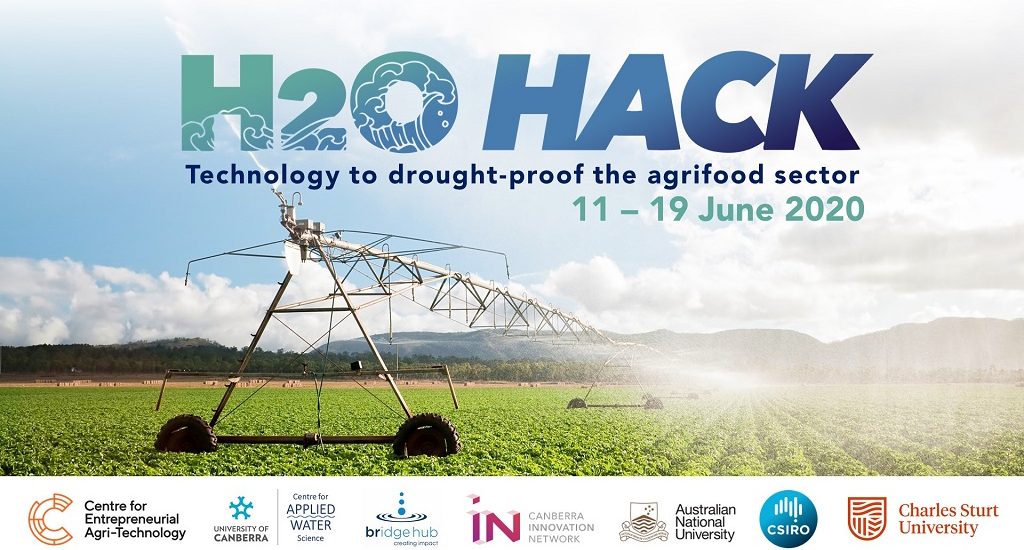- 30 June 2020
- Posted by: Canberra Innovation Network
- Category: Event News

“Wouldn’t it be great if we could give waterways kidneys?” asks AquaporIn Solutions, the winning team from last week’s Hackathon, H2O Hack: Technology to drought-proof the agrifood sector.
Tasked to come up with innovative ways to futureproof Australia’s agrifood water, 12 teams were given 5 days to refine their ideas and develop a pitch to be presented to the judging panel. The challenge was put together by research and innovation heavy-hitters the Centre for Entrepreneurial Agri-Technology, based out of the Australian National University, and the Centre for Applied Water Science, from University of Canberra.
Innovative Solutions
AquaporIn Solutions took the $2,500 first prize with their winning idea of using Aquaporin imbedded membranes to filter water. Other high-tech solutions included toxicity testing software from Groundwater heroes, and GramworkX’s on-site and satellite technology to tell farmers how much water each crop requires, aiming to give “More Crop Per Drop”.
Others found ways to innovate old-school tech. Los Aguadores introduced Tessera rock mulch, a mulch alternative, produced with sustainable materials, as “traditional solutions cast into the future”. The UC Environmental Science Society introduced Ollaflow: durable, environmentally-friendly terracotta/clay and limestone-based pipes, an alternative to PVC pipes.
CNT Solutions tapped into consumer power with WATERtRAC a mobile phone app that tracks product water usage and provides ratings. This also encourages corporate social responsibility. Does this sound like something you would download? Well, the judges and audience certainly thought so, as CNT Solutions snagged both Second Place and Crowd Choice Awards ($500 each)!
Could plant crops address the issue of ex-mine sites? Team Ruby’s “Emflowerment” project proposed to use the “phytoremediation properties of sunflowers in conjunction with the terrace-like infrastructure of open-cut mines”. Agrochemistry pitched metal-tolerant crops such as Hemp to redeem mine sites, the idea germinating from wondering if you could grow corn on the moon!
Looking at the big picture, Infinite Balance pitched a major desalination project to get water west of the great divide.
Team A Good CAWs teased the audience with the notion of beer brewed from Canberra-grown hops; hops grown in greenhouses directly adjacent to the lake and developed to address algae blooms.
Virtual Hackathon
The H2O Hackathon kicked off on Monday 15th June with an opening address from Minister for the Environment and Heritage, Mick Gentleman MLA, who encouraged participants to “let your ideas take root in fertile ground, and bloom”.
Throughout the week, teams attended workshops facilitated by the Canberra Innovation Network to develop their business canvases and pitches. High caliber mentors worked with teams to refine ideas and develop their pitches; access to these mentors is a crucial aspect of the event.
“As a 3rd undergraduate, having access to so many well educated and experienced mentors was fantastic, I was able to learn so much about the process of innovation and the agricultural industry in only a week. I would recommend the Hackathon for anyone who enjoys exposing themselves to new things and applying themselves in a competitive setting.” Said Adrian, one of the H2O Hack participants.
Canberra Innovation Network’s challenge was to run the Hackathon in a virtual format. The beauty of having the event online was that this allowed for a diverse and dispersed range of competitors. There were teams of students, retirees, and researchers from all over Australia, including representatives from 5 different Australian Universities (There was even a team from India!).
Even virtual the hype was real, with positive messages and congratulations flowing through the chat after each pitch. Passion and research was evident from each team.
This event was supported by CSIRO, The Bridge Hub and Charles Sturt University.
Teams were encouraged to put their ideas towards The Bridge Hub’s upcoming Water Challenge. The Bridge Hub’s aims to “turn world-leading research into commercial outcomes that can have a huge positive impact across the global agricultural food chain”.
The Bridge Hub 2020 Water Challenge offers the next opportunity for teams to put forward their research, ideas and solutions, contributing to solving some of the world’s most pressing problems, including managing water to reduce the impact of drought.
To learn more about upcoming innovation challenges and workshops, head to our events page.
Further reading: That’s a wrap on the H2O Hack – Centre for Entrepreneurial Agri-Technology

